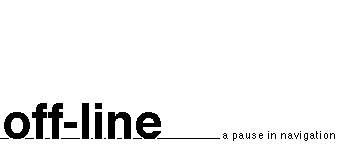 |
 |
October 1998 |
 |
 |
October 1998 |
| Giancarlo Livraghi gian@gandalf.it |
|
| |
|
| I’d like to discuss a subject that I consider very important: the
freedom (and culture) of the net. And the fact that, in my opinion, business and "web
marketing" interests can’t afford to ignore this problem. Please forgive me for a short digression. There is a remarkable little book written in 1982 by Robert Graves (the author of delightful essays on Greek mythology and excellent historic novels) called "Homer’s Daughter". He explained that there were countless Homers and as many versions of the Odyssey; the one we know, he suggests, was written by a woman (and he explains why). The book is her biography; and tells us about a world in which merchant ships carried goods but also ideas, philosophies, art... and "homers" that told poems, including those abut Ulysses and his travels. Without the merchants, there would have been no exchange of art, culture and knowledge; and because their ships carried such values merchants were well received and treated with respect. In a recent interview, Vint Cerf (one of the "fathers" of the interet) pointed out that one of the most important factors for a culture’s continued growth and vibrancy is unfettered contact with ideas and peoples from around the world. It isn’t any accident that the great cities of antiquity like Athens, Rome and Alexandria developed along ancient trade routes, eventually becoming crossroads of both knowledge and commerce. Since the dawn of human societies, there is no separation between trade and culture. I don’t think we need to worry because the net is becoming "commercial". Without online commerce (or, more broadly, business) the net would not grow and expand. But if the net lost its human and cultural values there would no longer be that vital network of relationships between people and communities in which also commerce can exist and flourish. Luckily a few people are beginning to understand. I’ve had interesting conversations with business people that are concerned about the distorted picture of the net offered too often by mainstream media. And also about the activities of all kinds of authorities (lawmakers, governments, public administrations... "big powers" of all sorts, including some large business interests) that can be seriously harmful even when they claim that they are trying to "protect" the net. I’ve been discussing this in several other articles, including the July issue of this column and a general list of the dangers in a paper called Cassandra that I wrote in 1996, revised last year... and may need a further update, because things aren’t getting any better. More and more unwanted "nannies", that don’t understand the net or its values, are trying to regulate it or bend it to their warped visions and interests before it’s had a chance to grow up. There are organizations around the world (such as ALCEI in Italy) that are working quite seriously on these issues. They need to work more closely together (I’m writing this while I am at a meeting in Boston in which, once again, these matters are being discussed). And, in each country, they need all the help and support they can get. |
|